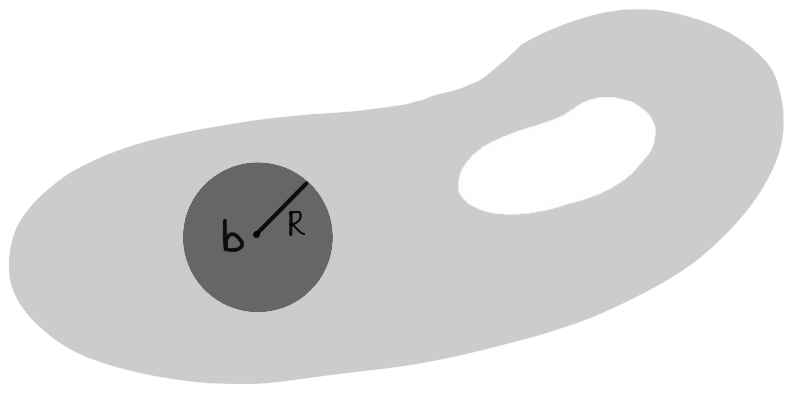
Figure 1: All points $z$ with $|z-b| \le R$ are conatined within $D$.
Home | Assessment | Notes | Worksheets | Blackboard
Our understanding of contour integration, holomorphic functions and contours culminate in Cauchy's integral formula: a surprising and powerful result with no analogue in the calculus of one real variable. We will spend most of the rest of the course applying and understanding its many consequences for holomorphic functions.
Fix a domain $D \subset \C$ and $f : D \to \C$ holomorphic. Whenever $\{ z \in \C : |z-b| \le R \} \subset D$ for some $b \in D$ and some $R > 0$ we have \[f(w) = \frac{1}{2 \pi i} \int\limits_\gamma \frac{f(z)}{z-w} \intd z\] for all $w \in \ball(b,R)$ where $\gamma(t) = b + Re^{it}$ on $[0,2\pi]$.
Fix $w \in \ball(b,R)$. For $r > 0$ let $\eta_r$ be the contour $\eta_r(t) = w + r e^{it}$ on $[0,2\pi]$. If $r$ is small enough then $\eta$ is contained within $\ball(b,R)$.
The function $h(z) = \dfrac{f(z)}{z-w}$ is holomorphic on $D \setminus \{ w \}$. Cauchy's theorem for several contours gives \[\int\limits_\gamma h = \int\limits_{\eta_r} h\] for all $r$ small enough. We will take the limit of the right-hand side as $r \to 0$.Fix $\epsilon > 0$. Since $f$ is holomorphic at $w$ it is in particular continuous at $w$ so there is $\delta > 0$ such that \[| f(z) - f(w) | < \epsilon\] whenever $|z-w| < \delta$. Now \[\int\limits_{\eta_r} h = \int\limits_0^{2\pi} \dfrac{f(w+re^{it})}{r e^{it}} ir e^{it} \intd t = i \int\limits_0^{2\pi} f(w + re^{it}) - f(w) + f(w) \intd t\] and \[\left| i \int\limits_0^{2\pi} f(w + re^{it}) - f(w) \intd t \right| \le 2 \pi \epsilon\] whenever $r < \delta$ by the estimation lemma, because in that case $|f(w+re^{it}) - f(w)| < \epsilon$ for all $0 \le t \le 2\pi$. We therefore have \[ \left| \int\limits_\gamma h - 2 \pi i f(w) \right| \le 2 \pi \epsilon \] whenever $r < \delta$. $\square$
Cauchy's integral formula is remarkable: it tells us that the outpus of $f$ inside $\ball(b,R)$ are completely determined by the outputs of $f$ on the edge of $\ball(b,R)$! This speaks to the rigidity of holomorphic functions, and stands in sharp contrast to functions on one real variable: there are many differentiable functions $f : [c,d]$ with prescribed outputs at $c$ and $d$.
In particular, holomorphic functions $f : D \to \C$ satisfy the mean value property \[ f(b) = \frac{1}{2\pi} \int\limits_0^{2\pi} f(b + Re^{it}) \intd t \] whenever $\{ z \in \C : |z - b| \le R \} \subset D$. The mean value property says that $f(b)$ is the average of the values $f(b + Re^{it})$ as $t$ varies from $0$ to $2\pi$.
Even more is true: as we will see in the next section, every holomorphic function can be expanded as a power series about any point in its domain!